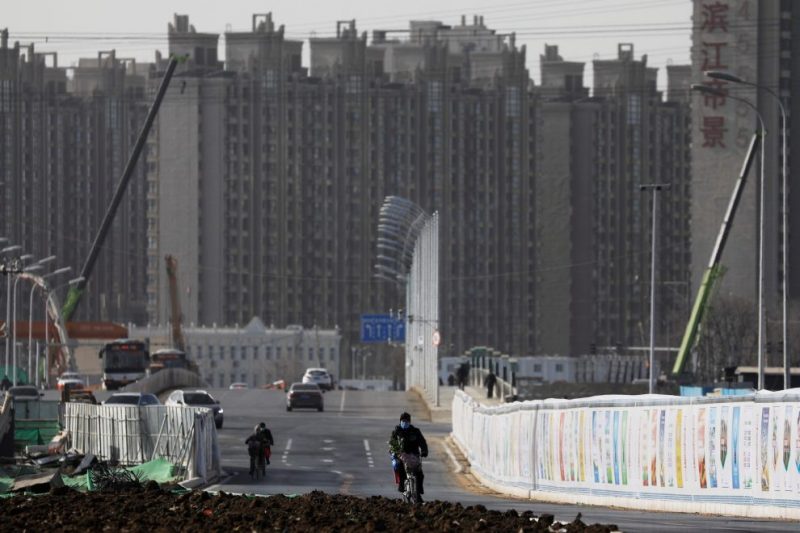The state of China’s economic slowdown has worried global investors who fear official data are sending strong warning signals.
These concerns are hitting stock markets across the world and sucking value from entities and assets exposed to its slump.
The impact has hurt currencies such as the Australian dollar, because of its high level of trade with China, to New Zealand dairy prices and shares of luxury goods giant LVMH, to miner BHP and the Las Vegas Sands casino firm.
With the post-pandemic period failing to bring a sustained recovery in consumer spending, or thaw the near-frozen property market, most analysts now figure the world’s second-largest economy is going to miss its 5% growth target this year.
ALSO SEE: Raimondo Begins China Visit But ‘Won’t Negotiate’ Chip Curbs
Blow to China confidence
Beneath the headlines, investors are even gloomier with higher-frequency and more arcane data from a shrinking current account surplus to ballooning deposits and soft surveys pointing to a deep-seated confidence problem, that appeared to intensify during the Covid lockdowns last year.
“It’s pretty weak,” said Sat Duhra, a portfolio manager at Janus Henderson who devises a macro score for countries by tracking seven factors including PMI surveys, real exchange rates, current accounts, growth estimates and liquidity.
“PMIs have been weak, GDP is being revised downward. It’s a tricky situation,” he said. “And I don’t see any point, at this point, in taking a bullish view on China when all of these things are going on.”
His fund invests in China, but away from economically sensitive sectors such as banks, property or industrials.
Beyond China, which is the largest trading partner of most of its neighbours and other big economies, souring demand is beginning to take a toll.
New Zealand’s Fonterra, the world’s biggest dairy exporter, has cut its farm gate milk price forecast twice in a month citing “reduced demand from key importing regions.” It previously noted that the largest slowdown was in China.
Last week BHP Group posted its weakest annual profit in three years and manganese-focused spinoff South32 said profit fell by nearly two thirds. New Zealand’s a2 Milk Co warned of weak growth in China’s infant formula market.
Shares of BHP, S32 and a2 fell.
Seema Shah, chief global strategist at Principal Global Investors in London, sees the slowdown biting in Europe, where investors tend to connect the fortunes of German manufacturers with the those of their Chinese customers.
“We have become a bit more gloomy on Europe,” she said, noting China also poses a risk to US equities.
Slowdown hits neighbours, trade worldwide
This year’s run of bad indicators has wrong-footed investors, who had been positioning for companies such as BHP and currencies such as the Australian dollar and Thai baht to rally as China emerged from the Covid pandemic in a blaze of spending.
Instead, Chinese visitors to top destination Thailand, for example, are barely a third of pre-pandemic levels, the baht is stalled and in Asia only Hong Kong’s Hang Seng has fallen further than Thai stocks’ 6.5% drop.
Even in Japan, the stock market success story of the year so far, portfolio manager Zuhair Khan at UBP Investments says he’s shorting or avoiding companies reliant on China sales.
The scale of the problem, with data showing consumer and producer prices falling and youth unemployment running over 20%, indicates an aggressive policy response is needed, and quickly, he said, something that is so far yet to arrive.
To be sure, although they too have lately retreated, stocks of companies such as casino-operator Las Vegas Sands and luxury-goods seller LVMH are up 11% and 16%, respectively, this year, against a 10% gain for world stocks, and some investors remain bullish.
“We expect group travel to resume in late 2023 and support Chinese spend on luxury goods globally,” Prashant Bhayani, Asia chief investment officer at BNP Paribas Wealth Management, said.
But it’s now a waiting game for valuations to reflect more realistic assumptions.
“The China reopening as a thematic has played out to some extent. However, I think more importantly, it has fallen short of initial expectations,” Jagdeep Ghuman, a portfolio manager for US asset manager Nuveen, said.
“It’s (now) very much on a case by case basis, driven by valuations. Overall we have seen that reset of expectations play out in the market and so there has been volatility in the shares of these companies.”
- Reuters with additional editing by Jim Pollard
ALSO SEE:
Weak Demand Pushes China Into Possible Year-Long Deflation
Multiple Moves Needed to Defuse China’s Local Debt Crises
China’s Graduates Face Worst Job Crisis in Generations – SCMP
























